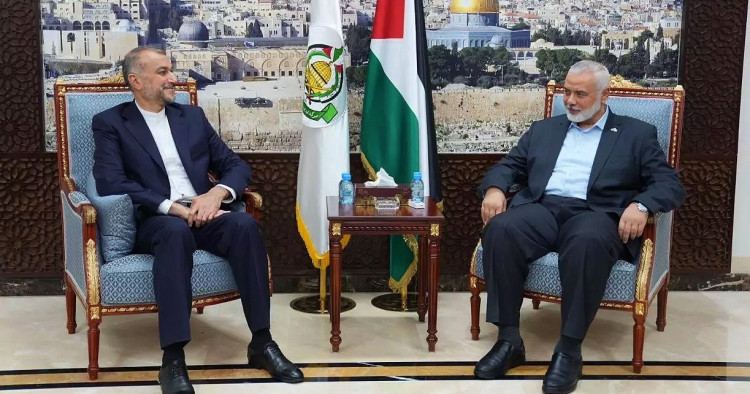For Iran, the Israel-Hamas war brings both threats and opportunities. The main threat is the total destruction of the military capacity of Hamas, an important member of the so-called “Axis of Resistance” led by Tehran. The prevention of this scenario has been at the heart of Iran’s regional diplomatic efforts since Oct. 7. The opportunity side is two-pronged. First, in the short term, Tehran has delighted in what it sees as the emergence of a new anti-Israel posture in the Islamic world and much of the Global South. But the ongoing conflict also provides Tehran with a far more meaningful opportunity: namely, to fundamentally shift its position toward Israel, a reality that should not be lost on the international community.
Above all, Iran sees this as a moment of revenge against Israel. The Iranian regime blames Israel not only for numerous assassinations on its soil over the last decade but considers the Jewish state as the principal force that drives international efforts to keep Iran isolated. In Tehran’s eyes, its years of financial and military support for Hamas were paid back with the attack on Oct. 7, which Iranian officials hailed as the moment Israel’s invincibility ended. Tehran has, thus, spent the last seven weeks striving to pressure both Israel and the United States to limit the response to Hamas, hoping that the group’s military wing in Gaza will not be entirely eliminated. That said, Iran and its main Arab militant ally, Lebanese Hezbollah, have made it clear that they will not enter the war directly to save Hamas.
To help Hamas on the diplomatic front, Tehran has effectively had to move toward the regional mainstream on the question of how to stop the conflict. True to form, Iranian rhetoric has been overblown: for instance, calling for the creation of an “Islamic Army” to confront Israel, or claiming to want to recruit and deploy volunteers to Gaza, although there is no evidence of Iranians joining the war. But in practice, Iranian calls for action against Israel have had to pass a basic reality check. In his speech last month to the Organization of Islamic Cooperation, in Riyadh, President Ebrahim Raisi called for Muslim action against Israel but never delivered any ultimatums. Supreme Leader Ali Khamenei first asked for Islamic countries to cut relations with Israel only later to plea merely for a suspension in ties. In short, Tehran is careful not to overplay its hand. And it clearly does not want to let the Gaza war become a point of contention with Arab countries that maintain diplomatic ties with Israel, like the United Arab Emirates — an important trading partner for Iran.
This takes us back to the opportunity for Iran to fundamentally shift its policy on Israel. Since 1979, the Islamists in Tehran have refused to recognize Israel’s right to exist. During the presidency of Mohammad Khatami (1997-2005), Tehran hinted at accepting a political resolution that was acceptable to the Palestinians but without ever openly offering to recognize Israel.
Today, despite widespread anger across the region at Israel’s war in Gaza, Tehran must factor in that the grand Islamic anti-Israel coalition it has hoped for is unlikely to materialize even after the war is over. Hence Iran’s militant stance against Israel will continue to isolate it if and once the international community begins to push for renewed Israeli-Palestinian talks.
The alternative for Tehran is to accept Israel but without necessarily declaring so openly. In fact, Iran has already taken a step in this direction during the ongoing Gaza war. In October, Tehran voted in favor of an Arab motion for a ceasefire between Israel and Hamas, a step that basically expressed Tehran’s reluctant admission of the Israeli state as a reality. The international community, particularly the Arab states that Tehran is eager to work with, need to encourage Iran to adjust its policies for it to be able to play a constructive role inside an Israeli-Palestinian peace process as opposed to simply acting as a spoiler from the outside.
Should a peace process follow this latest war, most likely to be led by the U.S. and the Arab states, Iran will have a hard choice to make. The Iranians no doubt know the high geopolitical costs associated with acting as a spoiler. Thirty years ago, Iran refused to accept the Oslo Accords, a decision that only deepened Tehran’s image as a radical actor and marginalized Iran from the rest of the region. Iran can repeat the same mistake and double-down on upholding its Axis of Resistance against Israel, or it can begin to look for ways to work with the majority in the region that seek a feasible political settlement to the Israeli-Palestinian conflict.
Alex Vatanka is the director of the Iran Program at the Middle East Institute and a Senior Fellow with MEI’s Black Sea Program.
This piece was originally published as part of an Expert Views special feature on how to restart the Middle East peace process.
Photo by Iranian Foreign Ministry/Handout/Anadolu via Getty Images
The Middle East Institute (MEI) is an independent, non-partisan, non-for-profit, educational organization. It does not engage in advocacy and its scholars’ opinions are their own. MEI welcomes financial donations, but retains sole editorial control over its work and its publications reflect only the authors’ views. For a listing of MEI donors, please click here.













